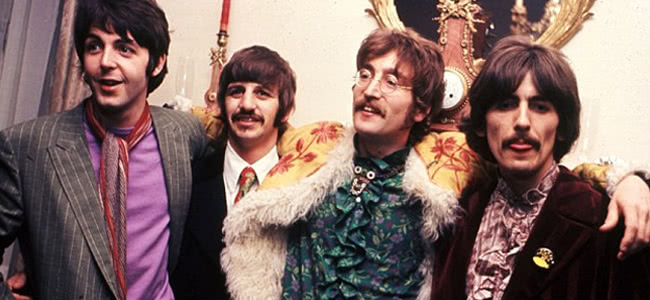It’s pretty much agreed upon that The Beatles changed everything. When they first burst onto the US music scene with their performance of ‘I Want To Hold Your Hand’ on the Ed Sullivan Show in 1964, it sparked a British Invasion across the Atlantic.
Within a matter of months, the Fab Four held all top five spots on the Billboard Hot 100 chart, a feat never to be repeated, and the US music press jumped aboard the Beatlemania hype train, with The Kinks and The Rolling Stones following through with their own assault on America. Modern music changed forever.
Or did it? As the Telegraph notes, an iconoclastic new study out of the UK suggests the Beatles may have been given too much credit for the musical revolution of the ’60s. According to researchers at Queen Mary University of London and Imperial College London, music was already changing before The Beatles.
The researchers studied the evolution of music between 1960 and 2010 and found that the changes that we attribute to the Fab Four’s impact had already been developing long before the band ever set foot on American soil.
“The music historians all talk about how the Beatles came to American and changed everything but it’s entirely coincidental,” Professor Armand Leroi of Imperial College, senior author on the paper told the Telegraph.
“They didn’t make a revolution or spark a revolution, they joined one. The trend is already emerging and they rode that wave, which accounts for their incredible success. The United States was already becoming rockier and more energetic, and moving away from mellow sounds like doo-wop.”
“You can already see that by the beginning of the 1960s,” said Professor Leroi. “They were good looking boys with great haircuts and British accents but as far as their music was concerned they weren’t anything new.”
Love The Beatles?
Get the latest The Beatles news, features, updates and giveaways straight to your inbox Learn more
The researchers’ findings contradict the narrative favoured by critics and music historians that The Beatles overthrew the dominant music styles of the age, which were influenced by the Memphis sounds of Elvis Preseley, as well as Johnny Cash and Jerry Lee Lewis.
The researchers compared all tracks which appeared on the US Billboard Hot 100 chart between 1960 and 2010 and found that similar sounds were present before The Beatles arrived. For example, The Beach Boys were already in the charts with ‘Surfin USA’.
The researchers looked for distinctive chord progressions, beats, lyrics, and vocals which defined certain genres. For example, blues and jazz are known for dominant 7th chords. Looking for such chords in the Billboard Top 100 illustrates the decline of jazz and blues, as these chords rarely appear now.
Similarly, the loud, energetic guitar sounds popularised by rock and roll in the ’50s and ’60s saw a resurgence in the 1980s with bands like Van Halen and chart-topping hair metal groups, but these sounds have largely rescinded from the charts in recent decades.
Interestingly enough, the Top Notes had already recorded ‘Shake It Up Baby’, which both The Isley Brothers and The Beatles would later immortalise as ‘Twist and Shout’. If that doesn’t seal it, even the band was skeptical about what impact that would have overseas.
As the Telegraph notes, before the band first departed for the US in 1964, Paul McCartney remarked, “They’ve got their own groups. What are we going to give them that they don’t already have?” However, Beatles biographer Mark Lewisohn is skeptical of the new study.
“Speak to anyone who was a young person in the US when The Beatles arrived and they will tell you how much of a revolution it was,” he said. “They were there and they will tell you that the Beatles revolutionised everything.”
[include_post id=”446361″]
But researchers disagree. In fact, their findings indicate that an entirely different genre had the biggest impact on US music in the last 50 years – hip-hop. The genre has dominated the charts since the early ’90s with Professor Leroi describing its impact as “huge”.
“Before that it had all been about synths and drum machines and everything really sounded like Duran Duran,” he added. His team is now hoping to go further back in time to trace the very development of genres like rock and roll.
Lead author of the paper Matthias Mauch, of the School of Electronic Engineering and Computer Science at Queen Mary University of London, said “For the first time we can measure musical properties in recordings on a large scale.”
“We can actually go beyond what music experts tell us, or what we know ourselves about them, by looking directly into the songs, measuring their makeup, and understanding how they have changed.”
“No doubt some will disagree with our scientific approach and think it’s too limited for such an emotional subject but I think we can add to the wonder of music by learning more about it.”
“We want to analyse more music from more periods in more countries and build a comprehensive picture of how music evolves.”




































